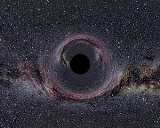How does Arthur Eddingtons scientific observations of a solar eclipse relate to Einsteins theory of general relativity? I know Arthur Eddington went ot Principe and observed a solar eclipse of 1919 and confirmed Einsteins theory. I dont understand Eddingtons observations and their specific relation to Einsteins theories? Can someone elaborate further. Thanks.
replied to: Information2
Replied to: How does Arthur Eddingtons scientific observations of a solar eclipse relate...
Ok, so until 1905 everyone had taken Newton's theory of motion to be accurate in all instances, including the motion of planets in space. Newton's idea was that space was constant and inflexible and that the planets and stars moved within it. Einstein's theory of relativity went against this by stating that space had to be flexible and bend so that the planets could move around their orbit. Eddington received this information when working at the Royal Observatory. He went to Principe to observe the eclipse and through his analysis of the photographs that he took and the use of physics and mathematics, was able to determine that Einstein's theory of relativity was accurate and that space bends thus causing light to bend as well. He did this by establishing that the placement of the stars near the sun was closer that the placement of those same stars at night when the sun was away from them. This could of course only be proven during an eclipse of the sun because this was the only time that the stars would be visible when the sun was near them.


